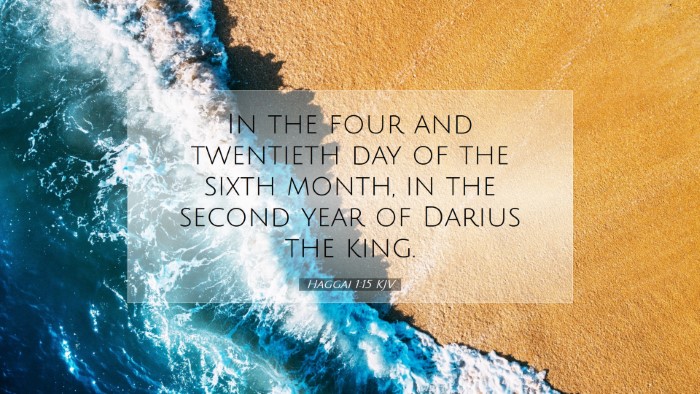Old Testament
Genesis Exodus Leviticus Numbers Deuteronomy Joshua Judges Ruth 1 Samuel 2 Samuel 1 Kings 2 Kings 1 Chronicles 2 Chronicles Ezra Nehemiah Esther Job Psalms Proverbs Ecclesiastes Song of Solomon Isaiah Jeremiah Lamentations Ezekiel Daniel Hosea Joel Amos Obadiah Jonah Micah Nahum Habakkuk Zephaniah Haggai Zechariah MalachiHaggai 1:15
Haggai 1:15 KJV
In the four and twentieth day of the sixth month, in the second year of Darius the king.
Haggai 1:15 Bible Commentary
Commentary on Haggai 1:15
Bible Verse: Haggai 1:15 - "In the second year of Darius the king, in the sixth month, in the first day of the month, came the word of the Lord by Haggai the prophet unto Zerubbabel the son of Shealtiel, governor of Judah, and to Joshua the son of Josedech, the high priest, saying."
Introduction
The Book of Haggai addresses the post-exilic community in Jerusalem, emphasizing the need to rebuild the Temple. This verse serves as the foundational moment from which the prophetic message unfolds. It invites us to consider not only the historical context but also the spiritual implications of God's call to His people.
Context and Historical Background
Haggai prophesied during a time of discouragement and apathy. The exiles had returned to Jerusalem but faced numerous challenges, including opposition from neighboring peoples and a lack of financial resources. This verse situates Haggai’s message precisely in the timeline of the Persian Empire under King Darius, providing a historical anchoring for the spiritual insights that follow.
Key Characters
- Zerubbabel: The governor of Judah, a descendant of David, representing the political leadership.
- Joshua: The high priest, signifying the spiritual authority and the role of the priesthood in the restoration of worship.
- Haggai: The prophet chosen by God to deliver a crucial message to His people, illustrating the divine initiative in Israel's restoration.
Divine Timing and Authority
Haggai’s prophecy is marked by specific dating: the second year of Darius, the sixth month, and the first day. This precision indicates that God operates within historical realities, affirming His sovereignty over time and nations. The mention of Darius emphasizes that even in the midst of imperial rule, God’s purpose prevails.
Insights from Matthew Henry
Matthew Henry notes the significance of divine communication through the prophet Haggai. He underscores that God's message comes at a time of both temporal authority and spiritual necessity. Henry emphasizes that the first day of the month symbolizes a new beginning, further pointing to the theme of renewal that runs throughout Haggai's prophetic work.
Insights from Albert Barnes
Albert Barnes emphasizes the critical role of leadership in responding to God’s call. He notes that the involvement of Zerubbabel and Joshua highlights the unity of civil and religious leadership in fulfilling God’s mission. Barnes further argues that Haggai’s role as a prophet illustrates God’s desire to restore His people, not merely to a physical structure but to a relationship characterized by worship and obedience.
Insights from Adam Clarke
Adam Clarke focuses on the implications of "the word of the Lord." He observes this phrase as a powerful reminder of God's continual guidance and communication with His people. Clarke highlights that the prophetic messages serve both as a call to action and a reminder of God’s presence. He stresses that the restoration of the Temple is indicative of the restoration of God's presence among His people.
Theological Implications
This verse resonates deeply with themes of divine sovereignty, prophetic authority, and community responsibility. It invites leaders and congregants alike to examine their priorities and discern God’s voice amidst their circumstances.
Call to Action
The initial message delivered by Haggai is not merely historical; it is an ongoing invitation for believers to recognize their roles within the larger narrative of God’s redemptive plan. It is a call to prioritize spiritual renewal over physical comfort and to rebuild that which has been neglected.
Conclusion
In conclusion, Haggai 1:15 serves as a pivotal point in understanding the role of prophetic voices in shaping the spiritual life of a community. It challenges pastors, students, theologians, and scholars to engage deeply with the Scriptures, recognizing that God speaks to His people with specificity and purpose. As we reflect on this verse, we are compelled to consider our own responses to God’s word and the ways in which we can contribute to the rebuilding of faith and community in our time.


